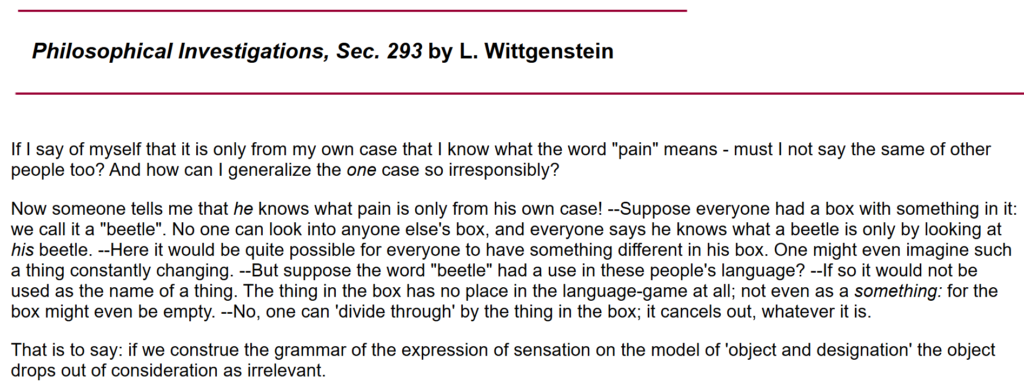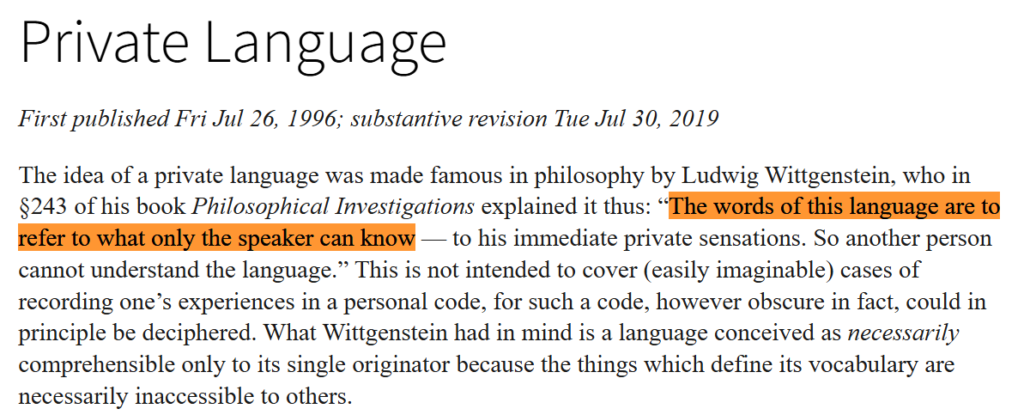Hadith methodology rests on a foundational assumption. The assumption that biographical criticism can reliably assess the internal qualities that make narrators trustworthy or unreliable. Hadith critics confidently pronounce on a transmitter’s honesty (ṣidq), precision (ḍabṭ), memory (ḥifẓ), and piety (wara’), which are all fundamentally private, internal states. But Ludwig Wittgenstein’s critique of “private language” is proof of why such assessments are philosophically weak. The very qualities that hadith science treats as objectively determinable are the kinds of private mental states that cannot be verified or communicated. In his Philosophical Investigations, Wittgenstein demolished the idea that private mental states can serve as the foundation for meaningful language and knowledge claims. His argument runs roughly like this:
- Privacy: Mental states, such as intentions, feelings, and internal experiences, are supposedly known only to the person experiencing them.
- Verification Problem: But for language to be meaningful, there must be public criteria for correct usage. Private states cannot provide such criteria because they are inaccessible to others.
- The Beetle in the Box: Wittgenstein’s famous analogy is that if everyone carries a box labeled “beetle” but no one can look into anyone else’s box, the word “beetle” cannot refer to the contents of the boxes. It must refer to something publicly accessible.

The point is that meaningful language about internal states must be grounded in public, observable behaviors and criteria, and not private experiences that remain inaccessible. Hadith methodology systematically violates Wittgenstein’s point by treating narrator reliability as if it were determinable through access to private mental states. Consider the standard categories used in the works of ilm al-rijal:
Honesty (ṣidq): Critics claim to determine whether a narrator intentionally fabricates or tells the truth. But honesty is fundamentally about internal intention, which is the private mental state that accompanies speech acts. How can external observers verify what a narrator “really intended” when transmitting?
Precision (ḍabṭ): This supposedly measures a narrator’s internal care and attention when memorizing and transmitting. But precision is a mental attitude, not a public behavior. The same external performance (reciting a hadith correctly) could result from meticulous care or a lucky coincidence.
Memory (ḥifẓ): Critics evaluate the quality of a narrator’s memory as if it were a stable, measurable internal faculty. But memory involves complex private processes of encoding, storage, and retrieval that remain completely inaccessible to external assessment. It shifts over time. Can someone be labeled with a good memory at 30 and retain that label at the age of 60?
Piety (wara’): Perhaps most problematically, critics claim to assess a narrator’s spiritual sincerity and God-consciousness. But piety is entirely about a private relationship with God. The paradigmatic example of what Wittgenstein showed cannot be publicly verified. The Quran points this out in 9:101.
[9:101] Among the Arabs around you, there are hypocrites. Also, among the city dwellers, there are those who are accustomed to hypocrisy. You do not know them, but we know them. We will double the retribution for them, then they end up committed to a terrible retribution.
—
Verse 9:101 establishes a fundamental epistemological principle: the impossibility of human access to private spiritual states. When God in the Quran tells the Prophet Muhammad “You do not know them, but we know them” regarding the hypocrites, it’s making a categorical statement about the limits of human knowledge. Even the Prophet – who hadith methodology treats as the ultimate judge of character and reliability – cannot penetrate the private mental states that distinguish genuine belief from hypocrisy.
This verse matters because it undermines the entire enterprise of jarh wa ta’dil (criticism and authentication) at its foundation. If the Prophet himself cannot reliably identify hypocrites (people whose outward religious observance masks inner disbelief) then how can later hadith critics claim to assess the wara’ (piety) of narrators they never met, centuries after their deaths?
When Ibn Hajar declares that Sufyan al-Thawri was “trustworthy, precise, and pious,” what is he actually saying? Following Wittgenstein’s beetle box analogy, Ibn Hajar has no access to the private contents of Sufyan’s mental “box.” Not his actual intentions, internal precision, memory processes, or spiritual states.

What Ibn Hajar does have access to are public behaviors:
- Sufyan’s transmissions match those of other narrators
- He was praised by contemporaries
- He avoided certain political associations
- His lifestyle appeared ascetic
But the leap from these public observations to claims about private mental states is what Wittgenstein showed to be illegitimate. The word “trustworthy” cannot meaningfully refer to Sufyan’s private intentions because those intentions are forever locked in his private “beetle box.” Wittgenstein’s critique connects to the classical philosophical problem of other minds. How can we know what goes on in someone else’s consciousness? Hadith sciences assumes this problem is easily solved through biographical assessment, but philosophy proves it’s actually intractable. Hishām ibn ʿUrwah‘s case is a great example. Critics note that his later Iraqi transmissions differed from his earlier Medinan ones and debate whether this reflects:
- Political pressure (private fear or ambition)
- Declining memory (private mental faculty)
- Changed motivations (private intentions)
- Different precision levels (private attitude toward accuracy)
But all of these explanations require access to Hishām’s private mental states. What critics actually observe are public phenomena: different transmission content in different contexts. The explanatory narratives about his internal states are a philosophical overreach and an attempt to ground public language in private experiences that remain permanently inaccessible. Wittgenstein’s approach suggests that meaningful assessment must focus on public criteria rather than private states.
Mentalist Approach (current hadith science):
- “Sufyan was honest” (claim about private intention)
- “His memory was excellent” (claim about private faculty)
- “He was pious and careful” (claim about private attitude)
Behaviorist Approach (Wittgensteinian):
- “Sufyan’s transmissions consistently matched those of other sources”
- “His reports were corroborated by independent witnesses”
- “No contemporaries accused him of fabrication”
The behaviorist approach makes no claims about inaccessible private states. It restricts itself to publicly observable patterns that can actually be verified and disputed. It seems like nowhere is the private language problem more devastating than in the hadith critics’ confident attributions of narrator intentions. When evaluating conflicting reports, critics routinely make claims like, Narrator X intended to deceive, Narrator Y was sincerely mistaken, Narrator Z deliberately omitted details for political reasons, etc. But intentions are private states. The same public behavior (transmitting a particular hadith) is compatible with radically different private intentions. Since intentions are private, there are no public criteria for determining which explanation is correct. Critics who claim to know the narrator’s intentions are making unfounded leaps from public behaviors to private mental states.
The logical positivists (whom Wittgenstein influenced despite later disagreements) emphasized that meaningful statements must be verifiable in principle. Apply this standard to the hadith criticism’s ilm al-rijal claims:
“Hisham ibn Urwah became careless in old age”. How can external observers verify changes in private attitudes toward precision?
“Ibn Shihab al-Zuhri was honest.” What public evidence could verify or falsify this claim about private intention?
“Sufyan al-Thawri had excellent memory.” What observable criteria distinguish “excellent” from “good” private memory faculties?
The answer in each case is that no public criteria exist for verifying these claims. They are unfalsifiable assertions about private states masquerading as empirical knowledge. Modern psychology and cognitive science have largely abandoned introspectionist approaches that claimed direct access to mental states. Instead, they focus on observable behaviors, measurable performance, and publicly accessible patterns. Neuroscience studies brain activity, not private experiences. Behavioral economics examines decision patterns, not internal motivations. Hadith sciences remain locked in pre-scientific assumptions about the transparency of mental states. It treats complex psychological phenomena (memory, intention, honesty, precision) as if they were directly observable properties rather than theoretical constructs that must be inferred from public criteria.


Pingback: Quranic Epistemology: Evidence Over Authority - HadithCritic